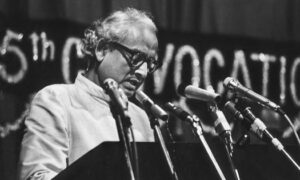
Would Ruth Prawer Jhabvala’s Heat and Dust be published today? Opinions were divided on its merits even when it won the Booker Prize 50 years ago. The novel still garners attention, not least because of the 1983 Merchant‑Ivory film adaptation for which Jhabvala herself wrote the screenplay. A decade ago, it even appeared on the UK Telegraph’s list of “the ten best Asian novels of all time”.
Jhabvala’s eighth novel intercuts between two Indias and two liaisons. The simmering tensions between British and Indian ways of life in the 1920s and the 1970s frame the stories of two women whose lives are clearly meant to echo each other.
In the earlier timeline, we meet Olivia, the beautiful, restless wife of a British colonial officer. Bored by the rituals of Anglo-Indian society, she begins an affair with the local Nawab, a charming Indian prince with his own agenda.
The second story is narrated by the unnamed granddaughter of Olivia’s husband by his second wife. She journeys to India to retrace Olivia’s steps, pieces together her tale from old letters and diaries, and has an affair with her Indian landlord, a local government employee. Along the way, the reader is treated to sights of overflowing gutters, packed buses, winds that blow desert sands, and other Indian scenarios.
The point of view throughout is overtly western, as reflected in Olivia’s account in the first part and her granddaughter’s in the second. As critics have noted, Jhabvala highlights not only the divergence between English and Indian perspectives but also a range of attitudes within the English community itself.
At the time, The Spectator called it the work of “a writer of an economy, somehow filled with events, beautiful to read”. The Saturday Review went further, calling it not just “superb” but “a gift to those who care for the novel, and to the art of fiction itself”. The London Magazine wasn’t as impressed, saying it felt “rather too contrived,” and The New York Times described it as “obscure and sombre”. Some saw the novel as offering a distinctive take on EM Forster’s A Passage to India, with added Austenesque touches.
The reception
In India, reactions were exasperated, to put it mildly. Notably, Nissim Ezekiel wrote: “I found Heat and Dust worthless as literature, contrived in its narrative structure, obtrusive in its authorial point of view, weak in style, stereotyped in its characters and viciously prejudiced in its vision of the Indian scene.” Not a fan, then.
Eunice De Souza was as unsparing. There was no progress towards a deepening of insights about the social forces at work in India in all Jhabvala’s work, she felt. “The writer shows no inclination whatsoever even to attempt to go beyond the facile emotional reactions to what she observes on the Indian social scene.”
Much of this analysis came from a close reading of Jhabvala’s frank and frequently-cited 1971 essay, “Myself in India”, in which she confessed: “I shut all my windows, I let down the blinds, I turn on the air-conditioner…All the time, I know myself to be on the back of this great animal of poverty and backwardness. It is not possible to pretend otherwise.”
Jhabvala herself shrugged off such criticism in a typically sardonic manner. “If you don’t say that India is simply paradise on earth, and the extended Hindu family the most perfect way of organising society, you’re anti-Indian,” she once said. “I don’t have many readers there.” For friend and fan Anita Desai, “she’s always had fervent admirers, but it’s very sad that there was, and continues to be, resentment towards a foreigner writing about India with such frankness and irony.”
In retrospect, the heightened Indian reaction is understandable, a prickliness arising from a time when Indian writing in English was still claiming its own voice and space. In this climate, Jhabvala’s position as a resident European who wrote with unsentimental acerbity was inevitably contentious.
As Salman Rushdie – whose own work did much to change perceptions and raise confidence in this context – once wrote: “Looked at from the point of view that literature must be nationally connected and even committed, it becomes simply impossible to understand the cast of mind and vision of a rootless intellect like Jhabvala’s.”
Nevertheless, even in the West, Heat and Dust hasn’t exactly worn well. In 2008, a Guardian critic cuttingly described it as “the literary equivalent of Coldplay; securely pedestrian, slightly patronising, tinged with the exotic, referencing far better work, but ultimately dull and pointless”. It is, he concluded, literature for people who hate literature. And in 2018, Maya Jasanoff commented that it felt “both warmed over and overwrought”.
Ideas of India
If Heat and Dust landed on a publisher’s desk today, it would probably raise some eyebrows in an era more alert to issues of authenticity, representation, and who gets to tell whose story. The idea of India as a tempting but dangerously corrupting place would also be seen as reflecting long-standing Western clichés about the East. Of concern would be the portrayal of Indian characters, who often serve as little more than catalysts for the English protagonists’ growth.
Yet, for all these valid contemporary objections, the novel is not so easily dismissed. The thematic tensions at its heart – colonial nostalgia, straitjacketed gender roles, cross-cultural desire – remain relevant. There’s also merit in Jhabvala’s unique “inside-outsider” point of view. Having lived in India for over two decades, her perspective is not that of a mere tourist, but of a long-term observer whose irony stems from intimate, if disenchanted, familiarity.
In a review of Jhabvala’s My Nine Lives, Pankaj Mishra also returned to her 1971 essay. Jhabvala was interested not in India, Mishra reminded us, but in herself in India. It is in this light that Heat and Dust can be read now: less as a portrait of India than as a document of a specific literary consciousness both engaged and aloof, still capable of stirring conversations about styles of authorship and representation.
Heat and Dust, Ruth Prawer Jhabvala, Abacus.
📰 Crime Today News is proudly sponsored by DRYFRUIT & CO – A Brand by eFabby Global LLC
Design & Developed by Yes Mom Hosting






